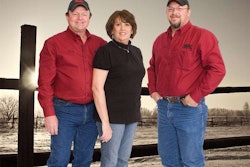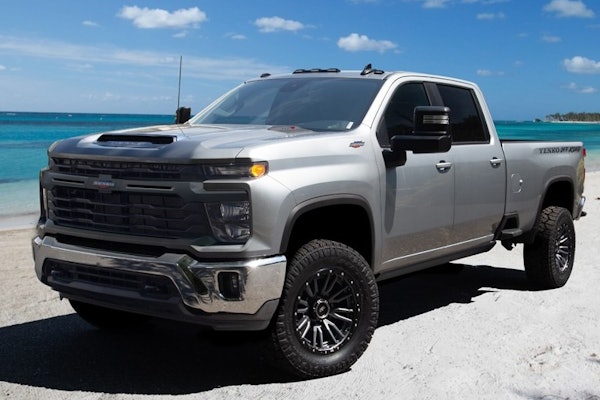His great-great grandfather, great grandfather, grandfather and father all did it. So it was a pretty sure bet that Brad Allen was destined to get into construction. In 1989 Brad graduated from high school and after years of working summers and part time, began working for his dad’s homebuilding company full time.
“We did everything,” Allen says. “Cleared the sites, dug the footers and basements and built the house from the ground up all the way through finish carpentry and cabinets. We didn’t sub anything out.”
But two years into this, his dad retired and left Allen with an uncertain future. At first he went to work for another construction company in Asheville, but he didn’t like it. “I was used to running the jobs. Dad gave me the reins, so it was a big change.” And after taking classes in welding and construction management at a local technical college, he began to realize he needed to start his own company.
So in 1994, Allen opened his own company with himself as the sole employee, a track loader, a backhoe and a small dump truck. Rather than homebuilding, his plan was to do more heavy construction and commercial building. To finance the start up he got help from the family – both his father and grandfather Ernest helped – and the banks and a good friend, James Whiteside with GBS Lumber. “James helped me a lot when I first got started,” Allen says. “He gave me credit to get going; lumber, concrete block, silt fence, erosion control, almost everything I needed.”
The first few months were lean. “Sometimes all I had to take to the bank were copies of my invoices,” he quips. His dad helped out and his grandfather Ernest, an electrician, even did the wiring on his commercial building projects. The running joke between Allen and his dad is that every Friday his dad calls him up and says: “So, did you make payroll? If you did, I guess you’re in business for another week.”
But it didn’t take long for the business to grow enough that he could start adding employees – including Dale Westall, now his shop foreman; and then Terry Farmer, general manager and Tim Wittenmore, job superintendent, Donna Willis, office manager and Barney Bechinski, construction superintendent. Farmer had also worked for Allen’s dad in the homebuilding business and helped the younger Allen develop many of his construction skills.
Diversity and growth
Today Brad Allen Construction has about 40 employees, about half of whom are equipment operators or truck drivers, and a broadly diversified set of offerings including earthmoving, sitework and commercial construction. The company does a lot of sports fields and stadiums, restaurant renovations, schools and capital improvement projects.
Early on Allen went after as much local, county and state work as he could find. Even though it was low bid, it was a way to get a foot in the door. This required some fortitude and patience. “I believe the best aspect of B. Allen Construction is his promptness and willingness to adapt to the unique situations we face in the school setting,” says R. Belvin Hall, assistant director of the Buncombe County public schools.
“The schools have a lot of mandatory prebid meetings,” Allen says. “If you’re not there, you don’t get to bid. And you might spend 20 hours in meetings to get to bid a project.” Allen also says county officials like to use e-mail for bid specs and communication and that having a computer and using it is also a must. Doing exactly what the local officials request has paid off. Not only does the company win more bids this way, but it also garnered the county overflow maintenance contract for repairs and emergency needs.
Shelter from the storm
Another customer that has benefited from Allen’s responsiveness is the KinderCare corporation, which builds day-care centers all around the country. B. Allen Construction had built three such facilities on the Gulf Coast, one near New Orleans. In the summer of 2005 as Hurricane Katrina drew closer to that city, it became obvious that the facilities his company built were soon going to be in need of serious repair.
Brad and his crews got the call from the national headquarters even before the storm hit. They took eight big trucks and about 20 people. “We bought plywood and metal roofing in North Carolina, rented a lot of generators from the Cat Rental Store, loaded them onto the trucks and headed south,” Brad says. Even before the government had figured out how to evacuate the people of New Orleans, B. Allen Construction crews were already hard at work, rebuilding one facility from the ground up and doing significant repairs to the two others. All totaled his crews spent nearly four months getting the KinderCare facilities back up and running.
People skills
No doubt about it, Allen says, his number one challenge as a businessman is finding good, qualified workers. On the upper end of the company he’s had the good fortune of being able to hire and benefit from the experience of several of his father’s employees. It’s more of a challenge to fill the entry level ranks. He’s recruited some among the local technical colleges. And he hires all his workers on a temporary, 30-day trial basis to see if they’re going to work out.
Allen says he pays close attention to the attitude of job applicants in the initial interview. “In the interviews I basically ask them what they’ve done. If they come in and tell you they can do everything, that can be a problem. But a person who comes in and doesn’t brag about themselves a whole lot, they might have a better chance than somebody who takes an hour to tell you what they’re the greatest at.”
To keep the crew members that work out, Allen pays them better than the competition and gives them plenty of work, too. “We hardly ever work 40 hours a week,” he says. Part of keeping his crews busy is out-of-town work. Allen’s crews and jobs venture as far as Miami, Florida, as well as Tennessee, South Carolina and Georgia. “When the weather is bad here and there’s not a lot going on, we can travel and go to the larger cities,” he says.
Bonuses also factor into the employee motivation plan. “If everything goes well, they’ll get a percentage bonus off the job,” he says.
In addition to keeping his employees motivated, Brad spends a lot of extra care in making sure his customers are satisfied. “The goal is no go-backs,” he says. “You have to make sure they’re happy the first time. We do construction meetings and walk-throughs all during the projects. You make sure that when you’re done, they’re happy. Then you bill the job.”
Equipment management
Allen maintains a fluid style of managing his equipment. He buys both new and used, about 50/50, with a close eye towards the jobs upcoming. “We’ll turn equipment for different jobs. Buy equipment for different jobs, rent for different jobs,” he says.
For financing, Allen says he doesn’t do much in the way of leases or loans, preferring to pay cash outright whenever possible. “But some of the new trucks we’ve bought have been zero-percent financing. We’ll take that anytime,” he says.
The company relies on two people to service its equipment. Dennis Clark, who is also the company grading supervisor, has been maintaining the equipment and driving the service truck for the better part of 10 years. But Allen also uses another part time mechanic and operator, Dwayne Roberson, to help out on service too.
Light equipment maintenance plays a big role in commercial building jobs, but in many construction companies its service can sometimes get overlooked. So Allen puts the superintendent on each job in charge of making sure the light equipment stays healthy. For repairs he takes his light equipment to the local United Rentals shop.
The fun stuff
Allen’s attachment to the community and its youth and sports teams runs deep. In addition to helping build many of its sports complexes, his company sponsors and he coaches girl’s basketball and softball teams in which his daughters Brianna, 13, and Brooklyn, 8, play.
Allen and his wife Stephanie also raise and ride horses in this scenic mountain community just south and west of Asheville. And Allen and several of his crew members share a love of woodworking. His office shows the results with several expertly made wooden truck and equipment models on display.
True to its North Carolina roots, B. Allen Construction sponsors a race car, a Chevrolet Monte Carlo in the late model stock car class, sanctioned by NASCAR. The car and it’s recently retired driver, Donnie Bishop, fell just short of a national championship in 2004, winning 14 of its first 16 races.







